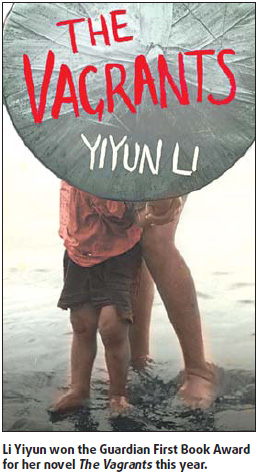Compelling book of a tumultuous decade
The year 2009 has been a year of good harvest for Chinese writers in terms of international recognition. Besides Su Tong who won the Man Asian Literary Award for The Boat to Redemption, Leslie T Chang bagged the Asian American literary award for Factory Girls and the poet Duo Duo received the Neustadt International Prize for Literature. Amid all this, Li Yiyun's Guardian First Book Award for her novel, The Vagrants, has gone relatively unnoticed.
Li - who stumbled into writing after attending a writers' workshop at Iowa, where she had gone to attend a PhD program in Immunology after graduating from Peking University, in 1996 - has been quietly picking up the awards ever since she began to get published. Her first collection of short stories - A Thousand Years of Good Prayers, 2005 - won the Frank O'Connor International Short Story Award and the Hemingway Foundation/PEN Award for a distinguished first book of fiction.

In 2007, she was included in the influential Granta Best of Young American Novelists anthology. Li is today easily one of the most prolific contributors to The New Yorker, writing essays, posts from her blog, personal history and fiction, it seems, with both hands.
The Irish writer Colm Toibin says he is taken in by what he calls Li's "darkness of touch". Her felicity with handling the grim, unsparing certainties on the horizons of a China, slouching toward a new dawn in the immediate aftermath of the "cultural revolution" (1966-76), in The Vagrants is awesome.
But at the end of the day, it's her ability to appreciate and acknowledge human beings as flawed creatures of circumstance that stands out. Li's empathy for her characters can disarm even the most skeptical critic, saturated with literature based on or taking off from the "cultural revolution" years.
Li can invest the most typical roles in her fictional world with an individualism (however bizarre) and a human culpability that transcends the limits of time and space in which the story is set.
Be it Gu Shan, the high-profile young Red Guard who in the first flush of youthful wrong-headedness thinks nothing of kicking and mauling pregnant women, or her father, the soft and refined Teacher Gu, who cannot come to terms with the fact that teaching Tang poetry to his only child has been a futile exercise, or Kwen, the middle-aged undertaker who rapes and mutilates Shan's already much-clobbered corpse - Li's novel is peopled with characters who are inherently vulnerable and twirled around fortune's little finger.
Set in 1979, The Vagrants is a story about what happens to some of the residents of the industrial town Muddy River, after the execution of Gu Shan is expedited. The pre-execution public denunciation draws almost the entire population of the town - Bashi, the sex-obsessed village idiot; Kai, the beautiful radio broadcaster married to a highly-placed government official; Tong, the boy who aspires to a career as a "young Communist pioneer"; Nini, born with a partially paralyzed hand and a deformed face and hence treated by her own indigent parents like an "unpaid maid"; the elderly and childless Hua couple, who raised seven girls they found abandoned while sweeping the roads, now claimed by government-run homes.
The people who come back from that meeting, and the one that follows soon after to mourn and vindicate Gu Shan's "martyrdom", find their lives dramatically altered, hurtling toward a dark, relentless destiny.
Li once conceded in an interview that her fiction is marked by a fatalistic overtone - one that is derived from a Chinese adage which says that whether or not human beings get to enjoy the fruits of their labor is determined by a heavenly superpower.
The lives of the ordinary people in her stories are put through intense and tumultuous reversals - not unlike the heroes in a Greek tragedy.
 0 Comments
0 Comments






